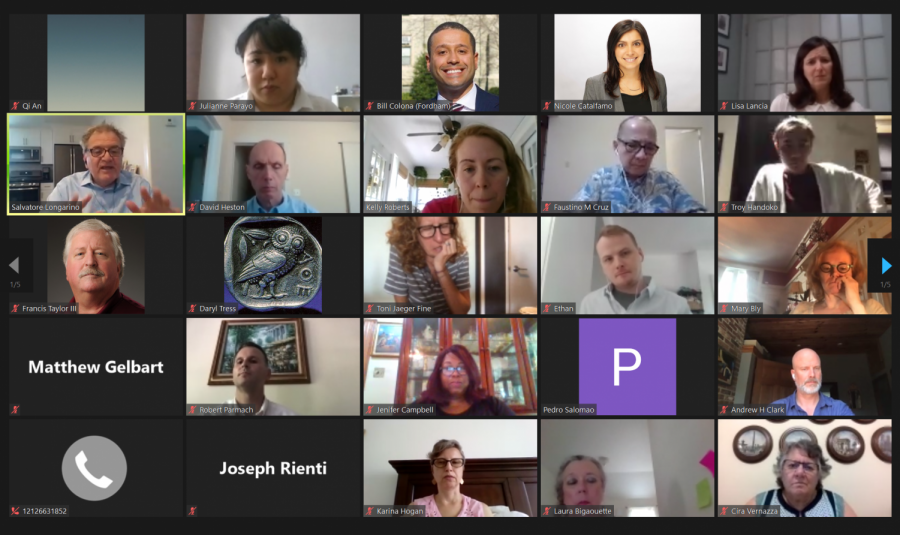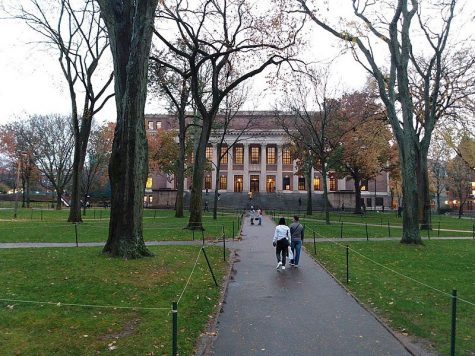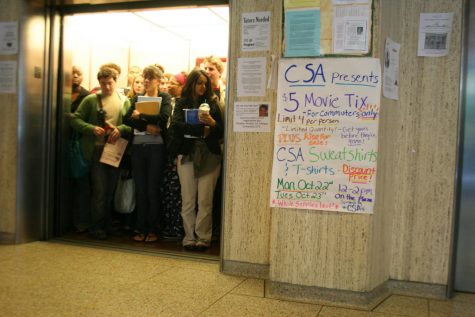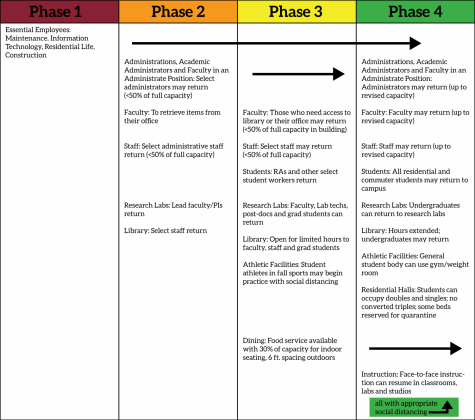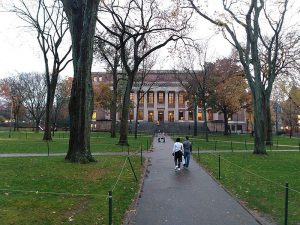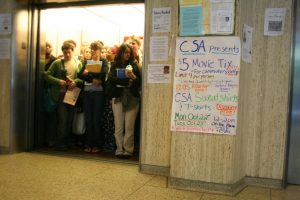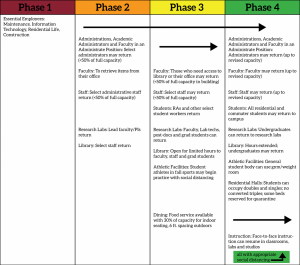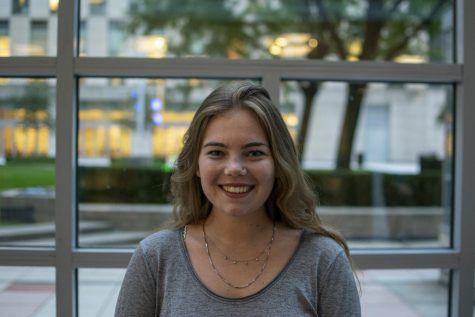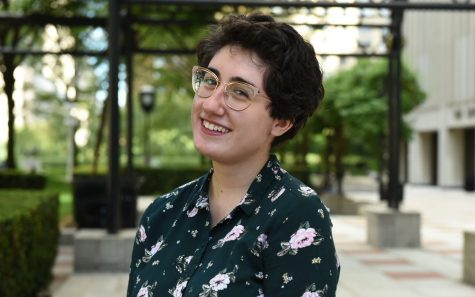ICE Ruling Further Complicates International Students’ Return
ZOOM
The Office of International Services discussed Fordham’s planned response to the ICE decision in a recent meeting, focusing mainly on the potential of offering one-credit in-person courses for international students.
July 13, 2020
“People think that international students are here in transit and after school, they leave. But during those four years of college, we start establishing our own lives here,” said Alexios Avgerinos, Fordham College at Lincoln Center (FCLC) ’21.
Avgerinos, an international student from Berlin, Germany, has an F-1 student visa in order to live and study in New York City. He is just one of more than 2,500 international students from countries all over the world who are enrolled at Fordham University.
On July 6, a decision from the Student and Exchange Visitor Program (SEVP), Department of Homeland Security (DHS) and U.S. Immigration and Customs Enforcement (ICE) revoked online course exemptions for international students and raised questions about whether returning to U.S. schools would be a safe, or worthwhile, decision.
The broadcast message states that students taking exclusively online classes during the fall will not be able to stay in the United States. This decision comes at a time when many universities have already begun planning for online fall semesters due to coronavirus concerns. Although Fordham has opted for a hybrid model for the fall 2020 semester and plans to reopen, there are concerns that high rates of infection across the country might lead to another campus shutdown.
Seeking to answer questions, the Office of International Services (OIS) hosted a virtual meeting on July 9 to further discuss the ways the university would support international students under the current rule. The meeting was primarily for administrators, but over 105 members of the Fordham community joined the Zoom call, including many students.
“We’ve been in communication in an ongoing basis with not only the elected officials and their staff who directly represent Fordham, but several others who have a connection with either the university or our office in one way or the other,” Bill Colona, director of government relations, federal and urban affairs, said on behalf of his department. “It appears that there is universal disapproval within our delegation related to the temporary rule. Our representatives are outraged and are working to support our schools and our international students.”
Much of the meeting was spent discussing the option of offering minimum-one-credit, in-person classes to international students. Salvatore Longarino, director of OIS, acknowledged that each of Fordham’s schools “might approach this challenge differently,” meaning that such classes would need to be tailored to fit each school’s learning model and course requirements.
Some questioned whether DHS and ICE would consider these courses legitimate. Longarino explained that Fordham’s courses have different designations in the Banner course catalog: R for a class at Rose Hill, L for Lincoln Center and D for digital. Any courses with an R or L designation, he said, would be considered legitimate in-person courses by the university. Professors will be in charge of the curriculum and class meetings, and he said it is unlikely that DHS or ICE will scrutinize those.
Percy Wu, FCLC ’21, is from Beijing but is currently quarantined in New York. He is concerned that his international friends might not be able to return to New York for the start of the classes.
I’d be even happier if [Fordham] took an active measure to ensure their international students can stay in the states.
— Danielle Eisenberg, FLCL '21
He explained how students “will have to get used to taking online classes in their own time zones. For some of them, that’s waking up in the middle of the night everyday to do so.” Wu implored Fordham to ensure that international students would be able to take in-person classes in the event of a campus shutdown.
There is a possibility that these measures might become unnecessary by the start of the semester if the ruling is overturned. Fordham has an August 1 deadline to report to DHS that it plans to pursue a hybrid model, Longarino said, hence the push to plan additional course offerings now. However, under the hybrid model, most existing classes should already qualify as in-person, he said.
Troy Handoko, FCLC ’22 and a student from Indonesia, brought up the issue of getting his F-1 visas and I-20 form, which provides supplementary information to confirm a student’s F-1 eligibility, renewed to confirm that Fordham is conducting hybrid education. Longarino assured Handoko that it should not be a problem, though no concrete steps of the process were provided on the call.
OIS also plans to launch a web page with resources for international students in the coming weeks. According to Longarino and adviser for F-1 students Julianne Parayo, the page will include answers to frequently asked questions for students in different scenarios, such as new versus returning students or students currently residing within versus outside the U.S. They also plan to include FAQ lists specific to each school within the university, and Longarino said OIS is working with the deans to obtain the necessary information for these lists.
Other students stated that traveling internationally to return to Fordham’s campus is also a source of concern. “I have a lot of concerns about returning to the US, not only because there are hardly any flights right now and so many restrictions but also because if Fordham did decide to open campus for in person classes in August, I think I would be putting my health at risk seeing the increase in the number of cases in New York,” said Preeshita Shah, Gabelli School of Business at Lincoln Center ’23, who is currently in Mumbai, India.
However, the uncertainty means that students who opt to remain at home and take exclusively online classes are unsure what that would mean for their visas in the future. “What then? Do I defer a semester or take a gap year? Because after this semester I’ve realised that online classes are not for me,” Shah said.
In the midst of the meeting, President Rev. Joseph M. McShane, S.J., emailed the Fordham community recognizing the new legislation and emphasizing the university’s commitment to supporting its international students.
“We believe our international students are a source of strength and intellectual diversity for the Fordham community, and we stand with them in the face of what seems at best to be an ill-considered and punitive policy,” he wrote.
Yet international students who are facing uncertainty about the future of their college careers say they have been waiting for this statement for days. After a since-deleted tweet circulated saying NYU and Columbia would offer one-credit face-to-face courses to support students, many felt that Fordham’s response was delayed. The English department got in touch with all but one of its students shortly after the ICE announcement, according to Department Chair Mary Bly, but otherwise, students have shared a different experience.
“I wish someone reached out to me. I wished I had received anything saying we are supporting you, we are condemning this decision. Just something saying please know that you have our full support,” Avgerinos said on the morning of July 9.
“I‘m glad Fordham is joining Harvard and MIT,” Danielle Eisenberg, FCLC ’21, said in reference to the lawsuit these schools have initiated to challenge the rule, and which Fordham has backed. “I’d be even happier if they took an active measure to ensure their international students can stay in the states.” Eisenberg is currently at her childhood home in Vienna, Austria, and she remains unsure about what the ICE ruling means for her.
Longarino encouraged students to email him with specific questions on their status.

